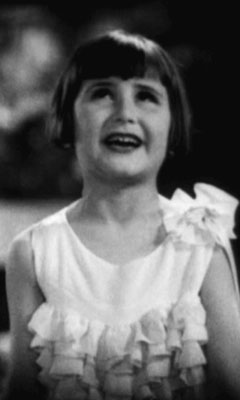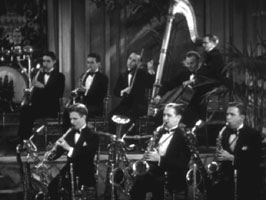 Eric Paul Tremaine was a minor jazz saxophonist of the 1920s, whose orchestra had a few jazz hit 78s in the late '20s & 1930s. He never broke out into the upper echelons of top orchestras, yet many fans of early jazz swear by his orchestra, Paul Tremaine & His Aristocrats (1929). Their one short film doesn't show them to perfect advantage, as some of the material is great, some only ordinary.
Eric Paul Tremaine was a minor jazz saxophonist of the 1920s, whose orchestra had a few jazz hit 78s in the late '20s & 1930s. He never broke out into the upper echelons of top orchestras, yet many fans of early jazz swear by his orchestra, Paul Tremaine & His Aristocrats (1929). Their one short film doesn't show them to perfect advantage, as some of the material is great, some only ordinary.
The Vitaphone Variety short begins with images of a rushing train, & a band on the soundtrack playing locomotive sounds. It then cuts to the Vitaphone stage decked out very fancy as in a top club, where the orchestra strikes up a fairly miserable ragtime rendition of "I've Been Working on the Railroad." The enormous chandalier over their head is more interesting than the band, but luckily it's not as good as they can get.
The entire band bursts into song doing a jazzed-up but still fairly awful choral rendition of "Working on the Railroad." Paul stands with his hands in his pockets singing with the musicians. He's kind of handsome with his thin half-circle of a mustach over his round mouth, but he seems almost afraid to move a muscle.
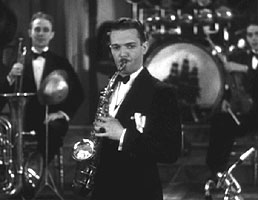 Then a charismatic little dude with a sax gets a fine lead solo toward the end of the number, pretty much saving the arrangement from utter failure. Then a charismatic little dude with a sax gets a fine lead solo toward the end of the number, pretty much saving the arrangement from utter failure.
Paul with a voice just perfect for a radio announcer tells us their next number will be "On the Road to Mandalay." As a marching tune it kind of sucks, but then Paul steps momentarily off stage to get his sax & it becomes quite evocative as a blues arrangement, the whole band harmonizing vocally behind his instrumental solo.
Their last number is introduced as being something you might hear on a Mississippi showboat. It's actually a medley of "Here Comes the Showboat" bleeding into "Old Kentucky Home"; "Oh, Susanna" & "Listen to the Mocking Bird" both of which are committed by a whole bank of saxophones; "Mississippi Mud," & other fragments of standards, most of it ragtime, bouncy & nice even if a little generic to the day.
The whole band sings through part of the arrangement, such lines from "Old Kentucky Home," "In the evening by the moonlight, you can hear the darkies singing'/ In the evening by the moonlight, you can those banjos ringin'..." It's just so strange how in days when segregation kept the honkies happy never to have to hang out with black folks that they still loved those minstrel tunes about happy "darkies."
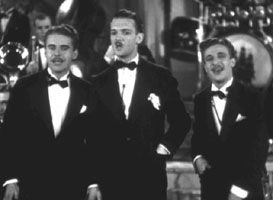 A singing trio consists of Paul plus two bandmembers (one of them the same guy with the sax solo on the "Railroad" number). They set aside their instruments to move center stage & harmonize exceedingly sweetly. A singing trio consists of Paul plus two bandmembers (one of them the same guy with the sax solo on the "Railroad" number). They set aside their instruments to move center stage & harmonize exceedingly sweetly.
The film comes alive while the trio sings. Their voices blend well in the era's pop jazz style. The song is "Mississippi Mud" & if the rest of the film is only so-so, this last bit makes it worth the whole show, despite more about "darkies" (in lyrics that later performers would change to "people"):
"When the sun goes down, the tide goes out/ The darkies gather 'round and they all begin to shout/ Rahhh! Uncle Duddy/ It's a treat to beat your feet on the Mississippi Mud/ Doe-doe doe-doe, doe-doe-doe..."
Visually this last bit has a certain fascination. These three guys almost look like animated maniquins, or characters in a Max Fleischer sing-along cartoon, with Paul in particular having a perfectly round face & round mouth with teency mustach, just like a simple drawing of a singer.
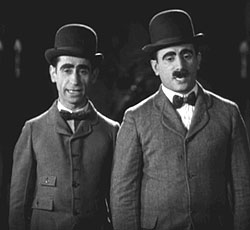 In the 1920s, Al Shaw & Sam Lee had a popular musical-comedy act at the Capitol Theater in New York.
In the 1920s, Al Shaw & Sam Lee had a popular musical-comedy act at the Capitol Theater in New York.
After the advent of sound films, in the 1930s they would continue to do their act, booked in cinema houses where they performed before or between films, as the more palacial movie houses were simultaneously vaudeville stages.
As soon as the curtain opens in Shaw & Lee: The Beau Brummels (1928) they begin singing: "When strolling through the park one day/ In the merry merry month of June/ The snowflakes they were snowing/ And the summer breeze was wafting/As the fishes in the treetops whistled so..."
So on go the vaguely silly words as Shaw & Lee stand perfectly still with straight faces, with the recurring verse about their beloved: "She was cross-eyed four-eyed & every other kind of eyed/ Hair-dyed, pye eyed, still she was a dream/ Knock-kneed, flat feet, both of them were left feet..."
They end it with a couple lines in Yiddish, remove their bowler hats, then go into a second comedy tune made up of advice they got from their dear old mum: "Always eat when you are hungry/ Always drink when you are dry/ Go to bed when you are sleepy/ But don't forget to breathe or else you'll die." That's the whole song, & they slowly put their bowlers back on.
Some comedy bits follow, with jokes like: "Twenty people under one umbrella, not one got wet." "How's that?" "It wasn't raining." Their delivery is good enough they're funny even if the jokes were stale in their days as in ours.
After doing the stand-up bits taking turns on who gets punchlines, they sing a final comedy tune with nasal voices: "The guy who wrote this song was deaf, he couldn't hear a note/ This is the verse. This is the verse/ But he knew all the rules & that is why he wrote/ The first verse first. The first verse first/ The bird who wrote the words was as crazy as a loon/ There's nothing to this song but the tune/
"And this is the chorus of the song/ This is the chorus you're hearing/ You make up the words as you go along/ Because no one pays attention anyhow/ Tra la la la, dum de dum/ If you wanna you whistle it or hum/ When you're singing this song to your friends/ Remember this is where the chorus ends..." & so on it goes, the lyrics getting more & more foolish. They conclude with some comedy dance moves.
A lot of the old vaudeville comics whose acts were preserved by Vitaphone probably weren't that good in their day & look worse now, but this deadpan duo were truly amusing guys, certainly among the best of the whole group of Vitaphone films among the extras in the Jazz Singer deluxe dvd set.
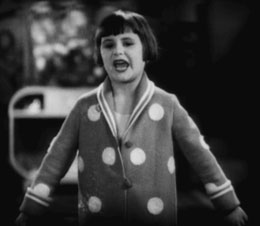 Whoever remembers the Dick Van Dyke Show knows Rose Marie, & might even know that she was once upon a time billed as "Baby Rose Marie" because she'd been a very tiny child star once upon a time.
Whoever remembers the Dick Van Dyke Show knows Rose Marie, & might even know that she was once upon a time billed as "Baby Rose Marie" because she'd been a very tiny child star once upon a time.
She's the star of Baby Rose Marie: Child of Wonder (1929), & it's an amazing contrast to the boozy-voiced old Rose Marie & this fantastically talented little tyke.
She's about five years old. She strolls center stage in a sailor suit & belts out "Heigh Ho, Everybody" with as much volume & charisma as Ethel Merman: "When song birds start singin'/ Heigh Ho, Everybody, Heigh ho..."
She knows how to put rhythm in that little body of hers, & just how to use her hands for effect, tossing in a bit of flapper-girl scat-jazz. Gads, what a show-girl! And unlike Shirley Temple, there's nothing forced or phony about her cuteness, though an edge of maturity in her manner is a mite unsettling.
Before starting her second number she doffs the pokadot sailor jacket to reveal her fluffy white dress. She sings "Who Wouldn't Be Jealous of You" which begins:
"I looked around for the longest time for someone to love/ But sweetheart I found you/ I never knew for the longest time the worries of love/ But now I'll say I do..."
With her Helen Kane/Betty Boopish sexiness one could almost suspect she was a midget, as the performance is just so not childish.
Her last number begins with some scatting & then right into "Don't Be Like That," that goes in part: "There's a girl next door to me/ She's keepin' company/ But somehow they don't know what love is all about..."
It's a Helen Kane hit but with alternate lyrics. It cinches Baby Rose's Helen Kane persona as she belts it out with sexy growls: "Eeeee, I don't wanna pet/ Whooo thinks that I'm all set/ You play so hard to get/ Baby boy don't be like that.
"Eee, I just wanna kiss/ Just one that you won't miss/ But you don't wanna kiss/ Don't be like that..." She'll work in some pretty decent scat & even a "boop ooppa do."
Continue to:
Still More Vitaphone Shorts among the extras
with the Jazz Singer 80th Anniversary Deluxe Edition
copyright © by Paghat the Ratgirl
|
